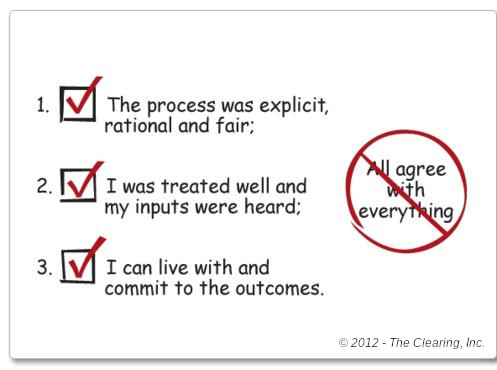People can live with an outcome they don’t like if they believe the decision-making process was fair and they have been personally treated honorably.
Trying to manage a process where the only definition of success is that “everyone agrees on everything” is often destined for failure. Group decision-making that operates according to the following rules has a much greater potential for success.
- Process Satisfaction: Each stakeholder believes that the decision-making process is explicit, rational, and fair.
- Personal Treatment: Each stakeholder feels treated honorably, meaning they have had ample opportunity to be heard, to make their opinions known, and to consider the opinions of others.
- Outcome Satisfaction: Each participant can live with the outcome. Notice the words, “live with”, as opposed to “agree with.”
The CONSENSUS PRIME recognizes that if people are satisfied with the first two elements above, they typically agree to the third.
The “dark side” of this PRIME is also valuable to understand. People may say they can live with the outcome, but if they remain significantly dissatisfied, even privately, with either of the first two elements, the dissatisfaction will undermine their commitment and detract from their participation. The result is neither desirable nor affordable when team members must work well together to produce extraordinary outcomes.
IN ACTION
Good leaders design decision-making processes to ensure fairness and opportunities for participation. They pay attention to stated and unstated agreement or disagreement.
SO WHAT?
Decisions which respect the CONSENSUS PRIME generally are more broadly supported and, as a result, more effective – even without everyone agreeing on every decision.

